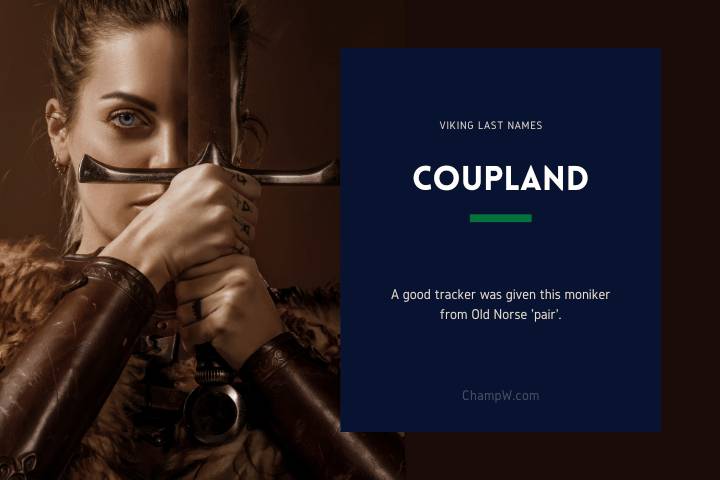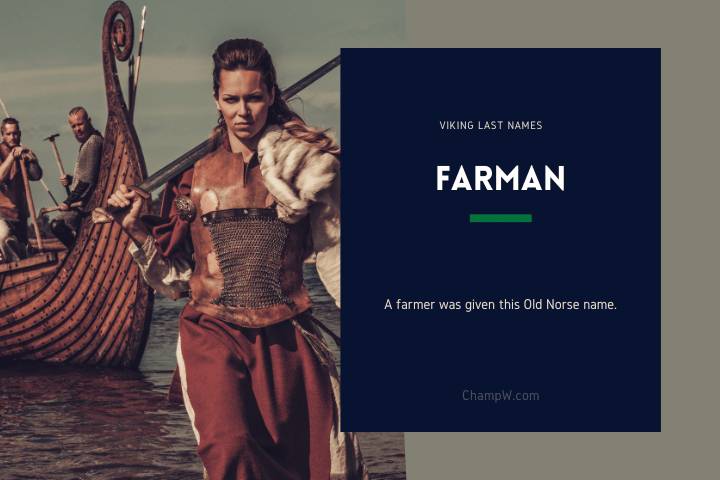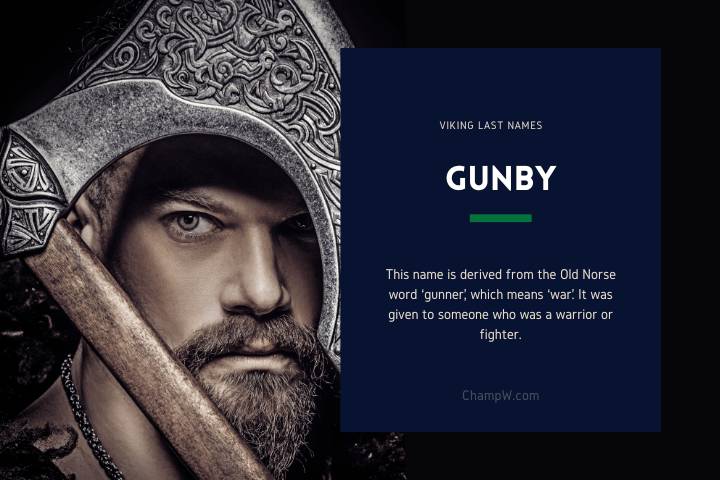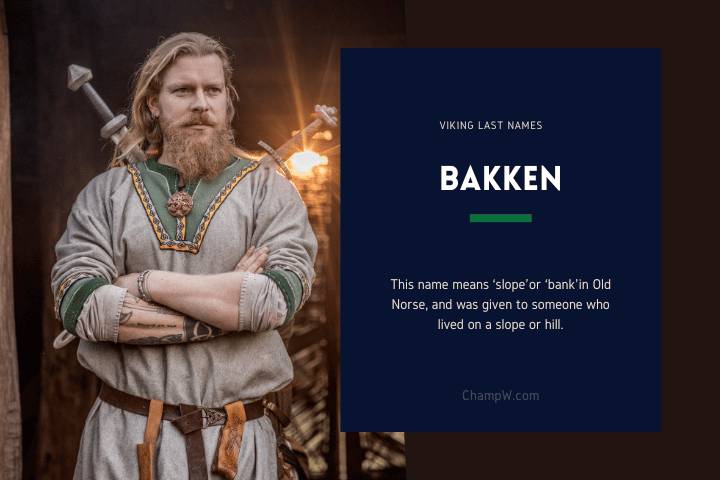The Vikings were some of the greatest mariners in history, so it is not surprising that their legacy is remembered for more than simply their historical significance. Their unique names are still in use today, providing an insight into the past. This blog examines some of the most unusual and distinctive Viking surnames, as well as their historical relevance. By studying their surnames, we can obtain a greater appreciation for the Viking culture and its historical significance.
The origins of Viking last names frequently included occupation, personal qualities, and geographical location. One of the most prevalent occupational names was fisk, meaning “fisherman.” Other occupation-related terms included bóndi, which signified “farmer,” and smith, which referred to as a metalworker. Human qualities were also utilized in the creation of surnames. For instance, a person with red hair could be given the name Raur, whereas a very tall person could be given the name Dfnir. Geographical sites were also utilized, like in the case of Flóki, whose name was derived from the island of Iceland.
There are numerous additional interesting and distinctive Viking surnames, each with its own tale. By comprehending the meaning of these names, we can obtain a deeper appreciation for the Viking culture and its historical significance.
List of Viking Last Names
So without further ado, let’s take a closer look at some of the most popular Viking Last Names:
- Haugen: This name means ‘hill’ or ‘hump’ in Old Norse, and was often given to someone who lived near a hill or mound.
- Dahl: This name means ‘valley’ in Old Norse, and was often given to someone who lived near a valley.
- Stuen: This name means ‘farmstead’ or ‘house’ in Old Norse, and was usually given to someone who lived on a farm or in a village.
- Aasen: This name means ‘mouth of the river’ in Old Norse, and was given to someone who lived near a river.
- Bakken: This name means ‘slope’ or ‘bank’ in Old Norse, and was given to someone who lived on a slope or hill.
- Johnson: This is a patronymic name that was derived from the personal name “John.” It was originally a Scottish name, but it was also used in Scandinavia. It’s still a popular name in Scandinavia today.
- Anderson: This name was derived from the personal name “Anders.” It’s a very common Scandinavian name, and it’s also popular in the rest of Scandinavia.
- Hansen: This is a patronymic name that was derived from the personal name “Hans.” It’s a common name in Denmark, Norway, and Sweden.
- Olsen: This is a patronymic name that was derived from the personal name “Olaf.” It’s a common name in Norway and Denmark.
- Svensson: This is a patronymic name that was derived from the personal name “Sven.” It’s a common name in Sweden.
- Nilsson: This is a patronymic name that was derived from the personal name “Nils.” It’s a common name in Sweden.
- Eriksson: This is a patronymic name that was derived from the personal name “Erik.” It’s a common name in Sweden and Finland.
- Jansson: This is a patronymic name that was derived from the personal name “Jan.” It’s a common name in Sweden.
- Gustafsson: This is a patronymic name that was derived from the personal name “Gustaf.” It’s a common name in Sweden.
- Jonsson: This is a patronymic name that was derived from the personal name “Jon.” It’s a common name in Sweden.
- Pettersson: This is a patronymic name that was derived from the personal name “Petter.” It’s a common name in Sweden.
- Persson: This is a patronymic name that was derived from the personal name “Per.” It’s a common name in Sweden.
- Applegarth: This name likely has its roots in the Old Norse word for ‘apple tree’, and so was probably given to someone who lived near an apple tree or orchard.
- Beesdow: This name likely has its roots in the Old Norse word for ‘bee’, and so was probably given to someone who was known for their hard work or productivity.
- Hoel: This name likely has its roots in the Old Norse word for ‘hollow’, and so was probably given to someone who lived in a valley or low-lying area.
- Cosby
- Sturgis
- Malham
- Saxby
- Ormiston
- Sorley
- Rokeby
- Hungate
- Birtwistle
- Owenby
- Tyrrell
- Micklethwaite
- Latham
- Satterthwaite
- Litherland
- Scarborough
- Holderby
- Bingham
- Quarmby
- Rolleston
- Gill
- Scruton
- Warby
- Colston
- Scarisbrick

Common Viking last names
Researching your Viking last names is a fun and meaningful way to connect with your Norse background. Viking names endure. Explore the most prevalent Viking last names to learn about their colorful history. This blog post examines the most prevalent Viking last names, how they were developed, and why they are still used.
- Ulland: This name likely has its roots in the Old Norse word for ‘wolf’, and so was probably given to someone who was known for their strength or ferocity.
- Grigsby: This name is of English origin and comes from a place name meaning “ditch field” from Old English hrycg “ridge” or “ridge of land” and dæl “dell, valley”.
- Crosthwaite: This name is of English and Scottish origin, derived from the Old Norse throat, meaning “throat”, and Old English threat, meaning “clearing in a wood”.
- Tooke: This name has its roots in Old Norse and likely refers to someone who was known for their hard work or productivity.
- Sparham: This name has its roots in Old Norse and likely refers to someone who was known for their hard work or productivity.
- Begbie: This name is derived from the Old Norse word ‘begging’, which means ‘sac or ‘bag’. It was often given to someone who was a beggar or trader.
- Cawston: This name is derived from the Old Norse word ‘knot’, which means ‘cattle’. It was given to someone who was a cattle farmer or breeder.
- Frost: This name is derived from the Old Norse word ‘frost’, which means ‘cold’. It was given to someone who was born during a cold winter.
- Gunby: This name is derived from the Old Norse word ‘gunner’, which means ‘war’. It was given to someone who was a warrior or fighter.
- Fenby: This name is derived from the Old Norse word ‘fjölnir’, which means ‘marsh’. It was often given to someone who lived near a marsh or fen.
- Gardham: This name is derived from the Old Norse word ‘garðr’, which means ‘enclosure’ or ‘yard’. It was given to someone who lived in a village or hamlet.
- Calthorpe: This name is derived from the Old Norse words ‘cold’ (cold) and ‘thorp’ (village). It was given to someone who lived in a cold village or town.
- Claxton: This name is derived from the Old Norse words ‘klárr’ (clear) and ‘tönn’ (pool). It was given to someone who lived near a clear pool or lake.
- Becker: This name is derived from the Old Norse word ‘beck’, which means ‘stream’. It was given to someone who lived near a stream or river.
- Rawdon: This name is derived from the Old Norse word ‘rauðr’, which means ‘red’. It was given to someone with red hair or a red complexion.
- Holderness: This name is derived from the Old Norse word ‘holm’, which means ‘island’. It was given to someone who lived on an island or in a coastal area.
- Buckby: This name is derived from the Old Norse word ‘búk’, which means ‘birch tree’. It was given to someone who lived near a birch tree.
- Tovey: This name is derived from the Old Norse word ‘tófa’, which means ‘black’. It was given to someone with black hair or a black complexion.
- Scowcroft: This name is derived from the Old Norse word ‘sluggish’, which means ‘shadow’. It was given to someone who was considered to be a ‘shadow’ or ‘ghost’.
- Airey: This name is derived from the Old Norse word ‘eyrir’, which means ‘river’. It was given to someone who lived near a river.
- Botten
- Whitgift
- Threlkeld
- Gamble
- Bagby
- Welby
- Docker
- Ormsby
- Beeby
- Fitton
- Thorburn
- Burby
- Askwith
- Lofton
- Thirlby
- Sparks
- Darby
- Lingwood
- Colby
- Outhwaite
- Garthwaite
- Poe
- Bushby
- Dowbiggin
- Lofthouse
- Cartledge
Cool Viking last names
A fantastic Viking last name is a conversation starter and a sense of belonging and individuality. Identifying with an ancient culture helps us feel linked to something bigger. Viking last names bring meaning and character to names. This blog will examine some of the most popular and cool Viking last names and their meanings.
- Lait: This name is derived from the Old Norse word ‘leit’, which means ‘lair’. It was given to someone who was considered to be a ‘lair’ or ‘hideout’.
- Thurman: This name is derived from the Old Norse word ‘thump’, which means ‘thunder’. It was given to someone who was considered to be strong and powerful like thunder.
- Sibthorpe: This name is derived from the Old Norse words ‘sif’ (victory) and ‘thorp’ (village). It was given to someone who was a great warrior or fighter.
- Knott: This name is derived from the Old Norse word ‘knotter’, which means ‘knot’. It was given to someone who was considered to be strong and powerful like a knot.
- Scarff: This name is derived from the Old Norse word ‘scarf’, which means ‘cliff’. It was given to someone who lived near a cliff or in a mountainous area.
- Wetherbee: This name is derived from the Old Norse word ‘veto’, which means ‘weather’. It was given to someone who was born during a particularly cold winter.
- Kirkby: This name is derived from the Old Norse word ‘kirkja’, which means ‘church’. It was given to someone who lived near a church or in a religious area.
- Strutt: This name is derived from the Old Norse word ‘strótr’, which means ‘path’. It was given to someone who lived near a path or in a rural area.
- Asby: This name is derived from the Old Norse word ‘ás’, which means ‘stream’. It was given to someone who lived near a stream or river.
- Iliffe: This name is derived from the Old Norse words ‘íll’ (evil) and ‘fámr’ (ghost). It was given to someone who was considered to be an evil spirit or ghost.
- Oldham: This name is derived from the Old Norse words ‘elder’ (fire) and ‘harm’ (village). It was given to someone who lived in a village that was prone to wildfires.
- Selby: This name is derived from the Old Norse word for ‘willow’, and was given to someone who lived near a willow tree.
- Rosen: This name is derived from the Old Norse word for ‘rose’, and was given to someone who lived near a rose bush.
- Hvit: This name is derived from the Old Norse word for ‘white’, and was given to someone with blonde or pale hair.
- Gunnar: This name is derived from the Old Norse word for ‘gun’ or ‘warrior’, and was given to someone who was a skilled warrior.
- Tora: This name is derived from the Old Norse word for ‘thunder’, and was given to someone who was strong and powerful.
- Aglionby: This name is derived from the Old Norse word for ‘eagle’, and was given to someone who was considered to be noble and courageous.
- Carr: This name is derived from the Old Norse word for ‘rock’, and was given to someone who was strong and stable.
- Antrobus: This name is derived from the Latin word for ‘second’, and was given to someone who was born second in their family.
- Axtell: This name is derived from the Old Norse word for ‘axe’, and was given to someone who was skilled in using this weapon.
- Holmyard
- Swainston
- Loseby
- Blaby
- Corey
- Gunstone
- Grimoldby
- Weatherbee
- Waithe
- Beetham
- Cleator
- Thurgood
- Busby
- Battersby
- Fawthrop
- Skipwith
- Gunton
- Trewhitt
- Turton
- Bigby
- Hebblethwaite
- Holtby
- Lusby
- Trollope
- Applewhite

Badass Viking last names
Vikings are often portrayed as strong, bold, and invincible. What constitutes a Viking? The last names Viking warriors and explorers took as a badge of honor are an important part of Viking culture. This site examines the most badass Viking last names and their fame.
- Trenholm: The Old Norse word for “pronghorn” was given to a swift, agile person.
- Turkel: The Old Norse word for “thor’s hammer” was given to a powerful person.
- Mansergh: Old Norse for “manse,” this name was given to someone who resided in a huge residence.
- Stackpole: This name comes from Old Norse for “stack” and was given to someone who lived near a rock pile.
- Skaife: The Old Norse word for “ski” was used to name a skier.
- Killingbeck: A person who lived by a stream was given this Old Norse name.
- Denby: A valley dweller was given this name.
- Sneath: The Old Norse word for “snake” was applied to a slippery and clever person.
- Seatter: An Old Norse name for someone who resided near a seat or high perch.
- Blaisdell: Old Norse for “black,” this name was given to someone with dark hair or skin.
- Enderby: A person who lived at the valley’s end was given this name from Old Norse.
- Maplebeck: A maple tree dweller was given this name.
- Ravenhill: A person who lived near a raven’s nest was named Ravenhill.
- Warboys: The Old Norse word for “war” was given to competent warriors.
- Thorold: From the Old Norse term for “Thor,” this name was given to a mighty person.
- Bousfield: A person who lived near a field was given this Old Norse name.
- Groby: An Old Norse name for someone who lived near a grove of trees.
- Thursby: A Thursday-born person was given this name.
- Orme: The Old Norse word for “serpent” was given to a sly and clever person.
- Busk: The Old Norse word “busk” was given to a brave and daring person.
- Sneath
- Seatter
- Blaisdell
- Enderby
- Maplebeck
- Ravenhill
- Warboys
- Thorold
- Bousfield
- Groby
- Thursby
- Orme
- Busk
- Gooderham
- Swaby
- Haig
- Birkbeck
- Thirsk
- Wetherby
- Danby
- Crosby
- Farman
- Brumby
- Rainford
- Willoughby
- Shimwell
- Grime
- Mellanby
- Haldane
- Roughton
- Tuckey
- Harby

Famous Viking last names
Viking surnames have an intriguing history. They frequently symbolize a larger group and Viking power and courage. Today, we honor these legendary last names. This blog will analyze the most renowned Viking last names, their meanings, and their continued use in modern culture.
- Gooderham: The Old Norse word for “good” was used to name a good person.
- Swaby: The Old Norse word for “swallow” was given to a fast and nimble person.
- Haig: The Old Norse term for “sea” was given to a brave and daring person.
- Birkbeck: A person who lived near a birch tree was named Birkbeck.
- Thirsk: The Old Norse term for “three” was used to name a third child.
- Wetherby: The Old Norse term for “weather” was used to name someone who lived near wether (a castrated male sheep).
- Danby: A valley dweller was given this name from Old Norse.
- Crosby: A crossroads resident was given this name from Old Norse.
- Farman: A farmer was given this Old Norse name.
- Brumby: An Old Norse name for someone who lived near a thicket or wood.
- Rainford: This name comes from the Old Norse word for “rain” and was given to a riverside resident.
- Willoughby: An Old Norse name meaning someone who lived by a willow tree.
- Shimwell: The Old Norse word for “shield” was given to a competent fighter.
- Grime: The Old Norse word meaning “Mask” was given to courageous and daring people.
- Mellanby: A meadow-dweller was given this name.
- Haldane: The Old Norse word for “half” was given to a competent warrior.
- Roughton: A person who lived near a rough or rocky environment was given this name from Old Norse.
- Tuckey: A competent worker was called “Tucker” in Old Norse.
- Harby: The Old Norse title for “Homestead” was given to dedicated workers.
- Holness: An Old Norse name for someone who resided near a hollow or valley.
- Holness
- Myerscough
- Weatherby
- Kelby
- Lewthwaite
- Catterall
- Ingleby
- Coupland
- Hasty
- Roscoe
- Norby
- Hanby
- Dowthwaite
- Flook
- Coghill
- Kilby
- Hesketh
- Tooley
- Kirkley
- Cory
- Bielby
- Thirkettle
- Scargill
- Kerr
- Scholes
- Scaife

Norwegian Viking last names
Norwegian Viking last names are among the most culturally significant. Norwegian Viking last names are rich in history and generally indicate a strong heritage. Harald, Gunnulf, and Ivar are Norse names that reflect Viking bravery and Norwegian culture. This blog explores the history, meaning, and origins of some of the most famous Norwegian Viking last names.
- Myerscough: The Old Norse term for “moor” was used to identify someone who lived near a bog or moor.
- Weatherby: Given to someone who lived in a place with extreme weather, this name comes from Old Norse.
- Kelby: The Old Norse word for “farmland” gave this name to a farmer.
- Lewthwaite: The Old Norse word for “loom” was applied to a weaver.
- Catterall: The Old Norse word for “cat” was given to a proficient hunter.
- Ingleby: A meadow-dweller was given this name.
- Coupland: A good tracker was given this moniker from Old Norse ‘pair’.
- Hasty: A swift runner was given this moniker, which comes from Old Norse.
- Roscoe: The Old Norse word for “rose” was used to name someone attractive or loving.
- Norby: A Scandinavian from the north was given this name from Old Norse.
- Whisby
- Tarleton
- Gadsby
- Manby
- Ellerby
- Tuke
- Frisby
- Biggar
- Hornsby
- Whinery
- Briscoe
- Lowthorpe
- Oglethorpe
- Skeat
- Bigland
- Stanwix
- Marbeck
- Oakey
- Kelham
- Croxton
- Asquith
- Hazelrigg
Powerful Viking last names
Names often reveal a person’s personality. Viking names, in particular, have a long and rich history. See why some of the most strong Viking last names have withstood centuries and are still honored today.
- Hanby: A competent farmer was given this name from the Old Norse term meaning hay.
- Dowthwaite: Old Norse for “south,” this name was given to someone from southern Scandinavia.
- Flook: The Old Norse word for “bird” was given to a proficient hunter.
- Coghill: The Old Norse word for “quill” was applied to a clever writer or journalist.
- Kilby: A person who resided near a church was given this Old Norse name.
- Hesketh: A talented equestrian was given this Old Norse name.
- Tooley: The Old Norse word for “tool” was given to a competent craftsman.
- Kirkley: The Old Norse term for “church” was used to designate someone who lived near a church.
- Cory: The Old Norse word for “raven” was given to a skillful hunter.
- Bielby: The Old Norse term for “cow” was used to name a skilled farmer.
- Thirkettle: The Old Norse word for “three” was given to a skillful warrior.
- Sowerby
- Applegarth
- Wilby
- Grigsby
- Crosthwaite
- Tooke
- Sparham
- Begbie
- Cawston
- Gunby
- Fenby
- Gardham
- Calthorpe
- Claxton
- Becker
- Rawdon
- Holderness
- Buckby
- Tovey
- Scowcroft
- Airey
- Lait
- Thurman
- Sibthorpe
- Knott
- Scarff
- Wetherbee
- Kirkby
- Strutt
- Asby
- Iliffe
- Oldham
- Selby
- Aglionby
- Carr
- Antrobus
- Axtell
- Trenholm
- Turkel
- Mansergh
- Stackpole
- Skaife
- Killingbeck
- Denby
Also Read:
Final Words
Viking last names are powerful and respected. They stand for pride and identity. These names are still loved and proudly carried by their owners.
